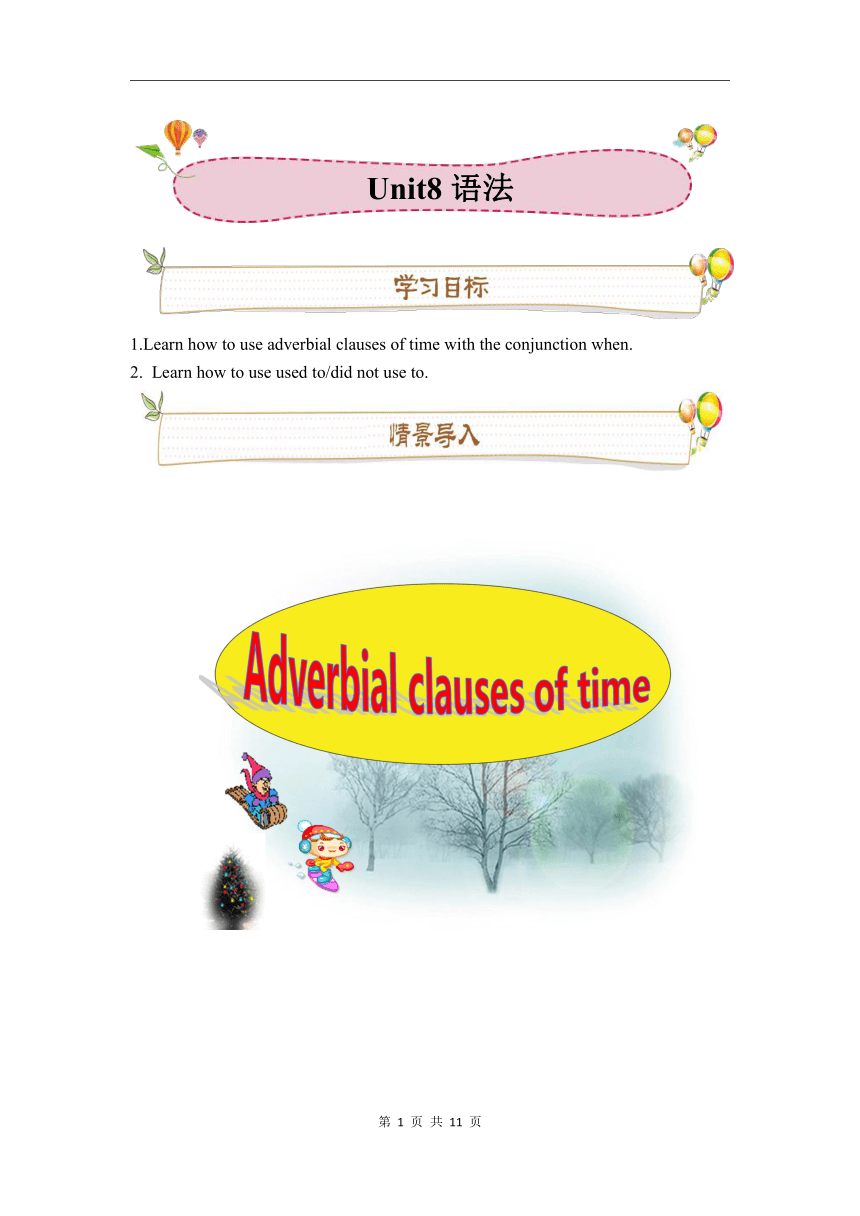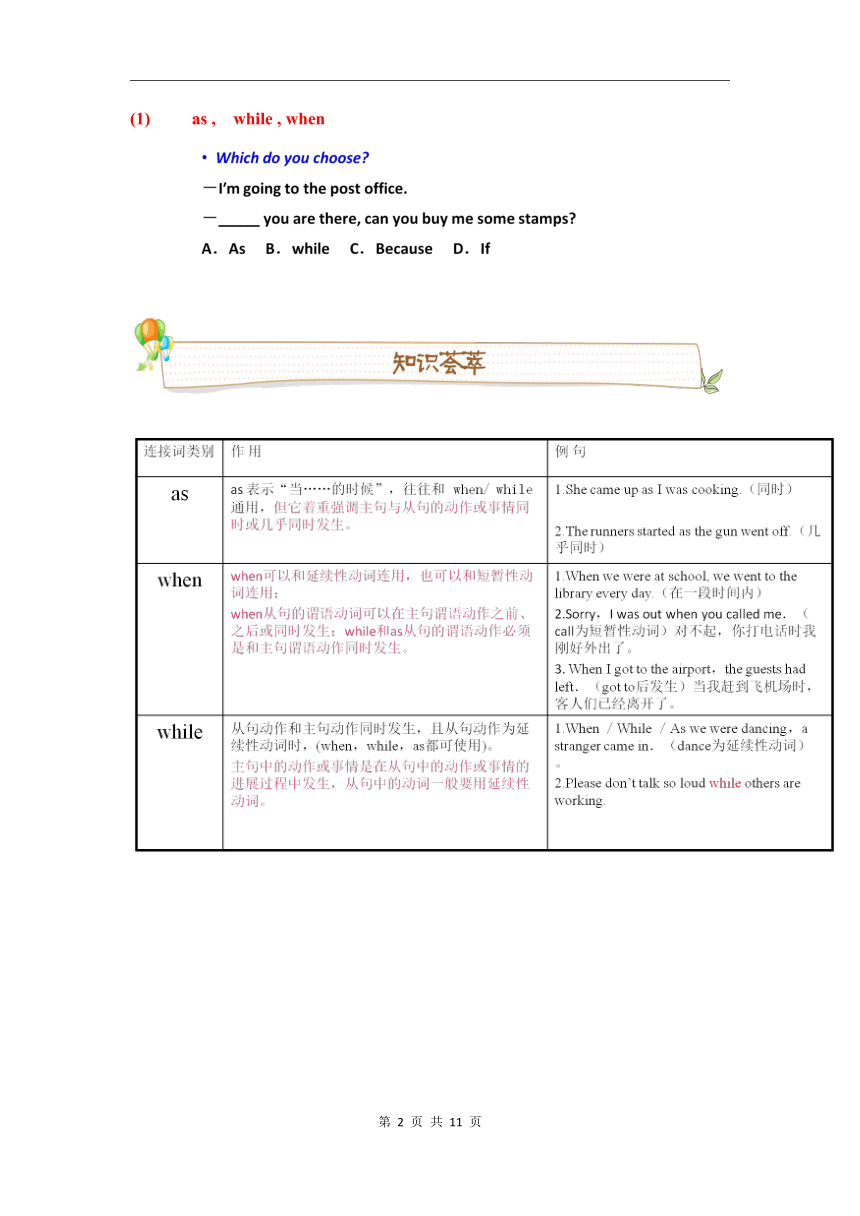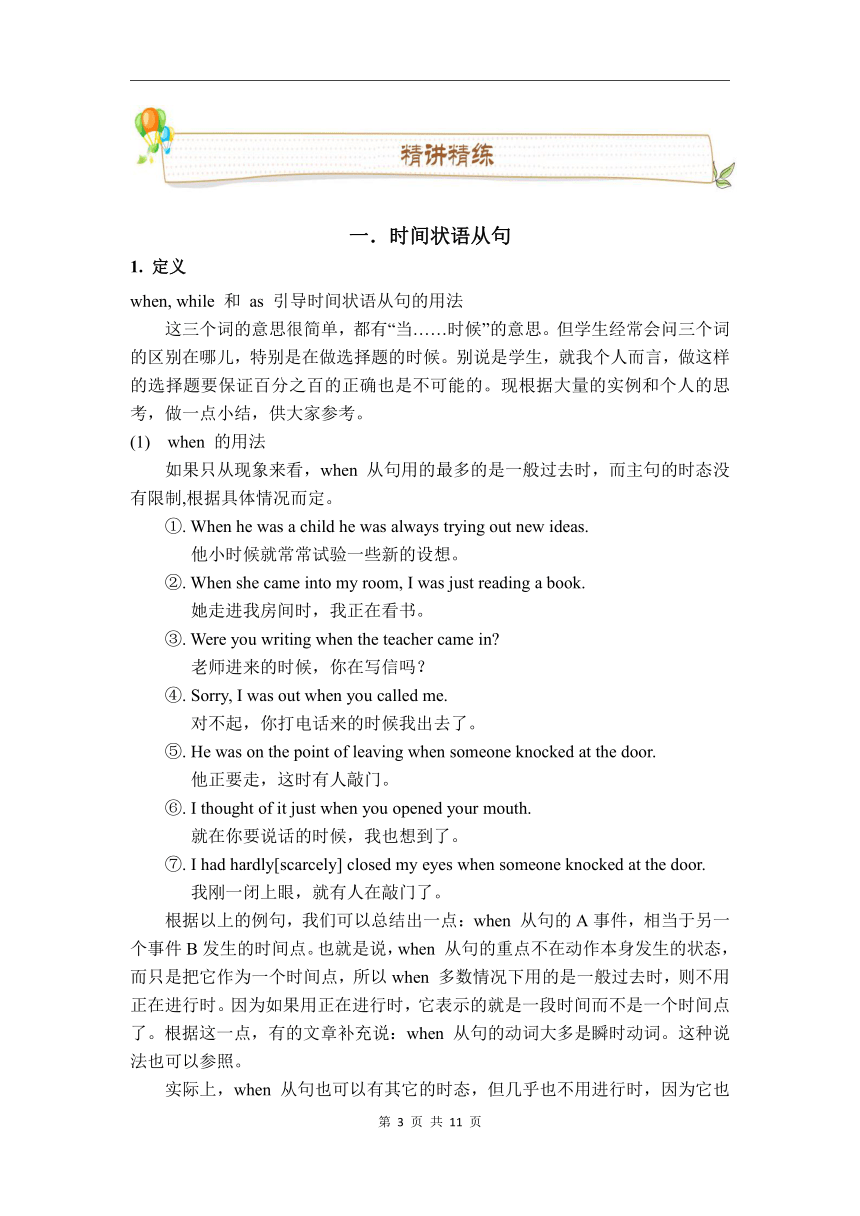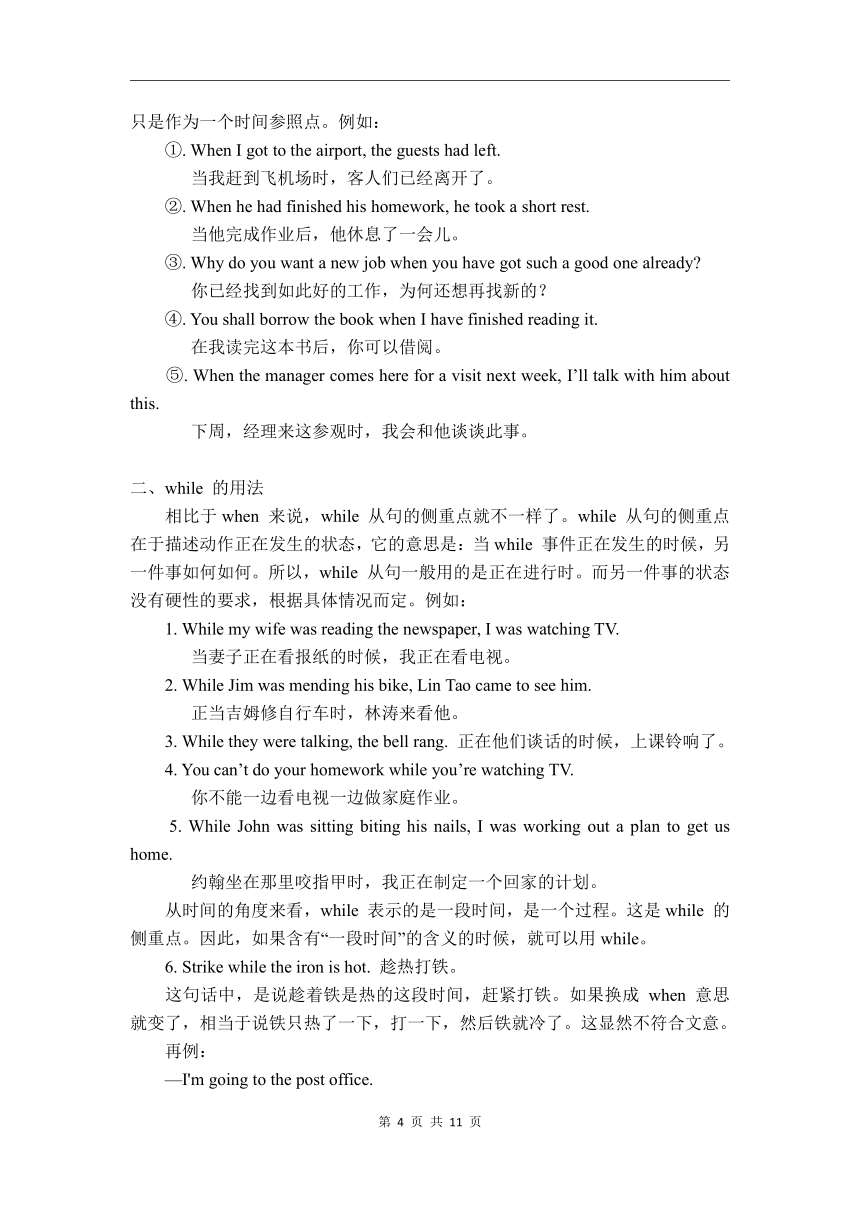Unit8 From Hobby to Career 语法讲义及答案
文档属性
| 名称 | Unit8 From Hobby to Career 语法讲义及答案 |

|
|
| 格式 | zip | ||
| 文件大小 | 1.5MB | ||
| 资源类型 | 教案 | ||
| 版本资源 | 牛津深圳版 | ||
| 科目 | 英语 | ||
| 更新时间 | 2021-05-14 20:13:07 | ||
图片预览





文档简介
Learn
how
to
use
adverbial
clauses
of
time
with
the
conjunction
when.
Learn
how
to
use
used
to/did
not
use
to.
as
,
while
,
when
一.时间状语从句
1.
定义
when,
while
和
as
引导时间状语从句的用法
这三个词的意思很简单,都有“当……时候”的意思。但学生经常会问三个词的区别在哪儿,特别是在做选择题的时候。别说是学生,就我个人而言,做这样的选择题要保证百分之百的正确也是不可能的。现根据大量的实例和个人的思考,做一点小结,供大家参考。
(1)
when
的用法
如果只从现象来看,when
从句用的最多的是一般过去时,而主句的时态没有限制,根据具体情况而定。
①.
When
he
was
a
child
he
was
always
trying
out
new
ideas.
他小时候就常常试验一些新的设想。
②.
When
she
came
into
my
room,
I
was
just
reading
a
book.
她走进我房间时,我正在看书。
③.
Were
you
writing
when
the
teacher
came
in?
老师进来的时候,你在写信吗?
④.
Sorry,
I
was
out
when
you
called
me.
对不起,你打电话来的时候我出去了。
⑤.
He
was
on
the
point
of
leaving
when
someone
knocked
at
the
door.
他正要走,这时有人敲门。
⑥.
I
thought
of
it
just
when
you
opened
your
mouth.
就在你要说话的时候,我也想到了。
⑦.
I
had
hardly[scarcely]
closed
my
eyes
when
someone
knocked
at
the
door.
我刚一闭上眼,就有人在敲门了。
根据以上的例句,我们可以总结出一点:when
从句的A事件,相当于另一个事件B发生的时间点。也就是说,when
从句的重点不在动作本身发生的状态,而只是把它作为一个时间点,所以when
多数情况下用的是一般过去时,则不用正在进行时。因为如果用正在进行时,它表示的就是一段时间而不是一个时间点了。根据这一点,有的文章补充说:when
从句的动词大多是瞬时动词。这种说法也可以参照。
实际上,when
从句也可以有其它的时态,但几乎也不用进行时,因为它也只是作为一个时间参照点。例如:
①.
When
I
got
to
the
airport,
the
guests
had
left.
当我赶到飞机场时,客人们已经离开了。
②.
When
he
had
finished
his
homework,
he
took
a
short
rest.
当他完成作业后,他休息了一会儿。
③.
Why
do
you
want
a
new
job
when
you
have
got
such
a
good
one
already?
你已经找到如此好的工作,为何还想再找新的?
④.
You
shall
borrow
the
book
when
I
have
finished
reading
it.
在我读完这本书后,你可以借阅。
⑤.
When
the
manager
comes
here
for
a
visit
next
week,
I’ll
talk
with
him
about
this.
下周,经理来这参观时,我会和他谈谈此事。
二、while
的用法
相比于when
来说,while
从句的侧重点就不一样了。while
从句的侧重点在于描述动作正在发生的状态,它的意思是:当while
事件正在发生的时候,另一件事如何如何。所以,while
从句一般用的是正在进行时。而另一件事的状态没有硬性的要求,根据具体情况而定。例如:
1.
While
my
wife
was
reading
the
newspaper,
I
was
watching
TV.
当妻子正在看报纸的时候,我正在看电视。
2.
While
Jim
was
mending
his
bike,
Lin
Tao
came
to
see
him.
正当吉姆修自行车时,林涛来看他。
3.
While
they
were
talking,
the
bell
rang.
正在他们谈话的时候,上课铃响了。
4.
You
can’t
do
your
homework
while
you’re
watching
TV.
你不能一边看电视一边做家庭作业。
5.
While
John
was
sitting
biting
his
nails,
I
was
working
out
a
plan
to
get
us
home.
约翰坐在那里咬指甲时,我正在制定一个回家的计划。
从时间的角度来看,while
表示的是一段时间,是一个过程。这是while
的侧重点。因此,如果含有“一段时间”的含义的时候,就可以用while。
6.
Strike
while
the
iron
is
hot.
趁热打铁。
这句话中,是说趁着铁是热的这段时间,赶紧打铁。如果换成
when
意思就变了,相当于说铁只热了一下,打一下,然后铁就冷了。这显然不符合文意。
再例:
—I'm
going
to
the
post
office.
—While
you're
there,
can
you
get
me
some
stamps?
三、as
的用法
as
从句表示的也是一件事情正在发生,另一件事也正在进行当中。但与
while
从句不同的是,as
从句用的一般不用正在进行时,而只是一般过去时。as
从句一般可以翻译成“边……边……”。例如:
1.
As
my
mother
sang
those
old
songs,
tears
ran
down
her
cheeks.
当我妈妈唱起那些老歌时,眼泪顺着她的脸颊流了下来。
2.
The
students
took
notes
as
they
listened.
学生们边听课边做笔记。
3.
As
we
talked
on,
he
got
more
and
more
excited.
我们继续往下谈的时候,他越来越兴奋。
4.
The
little
girls
sang
as
they
went.
小姑娘们一边走,一边唱。
5.
Just
as
he
caught
the
ball,
there
was
a
tearing
sound.
当他抓住球的时候,有一种撕裂的声音。
as
表达的事件,往往只是主句动作发生的背景或条件时,as
只是一个次要的时间说明,不像while
从句有强调
while
动作本身的意思。因此,as
常常翻译成“随着……”之意。
例如:
1.
As
the
time
went
on,the
weather
got
worse.
随着时间的推移,气候更加糟糕。
2.
The
atmosphere
gets
thinner
and
thinner
as
the
height
increases.
随着高度的增加,大气越来越稀薄。
3.
As
years
go
by,China
is
getting
stronger
and
richer.
随着时间一年一年过去,中国变得越来越富强了。
少数情况下,如果强调动作正在发生,as
从句也可以用正在进行时。这只能算是特例了。
1.
The
sad
mother
sat
on
the
roadside,
shouting
as
she
was
crying.
伤心的妈妈坐在路边,边哭边叫喊。
2.
As
we
were
going
out,
it
began
to
snow.
正当我们出门时,雪开始下起来。
3.
He
came
in
as
I
was
going
to
bed.
我正要上床睡觉,他进来了。
四、when,
while,
as
的互换
如果从句动作和主句动作同时发生,并且从句动作为延续性动词时,when,while,as
可以互换使用。这种情况下,它们的细微区别恐怕连英、美人自己也说不清了。
1.
When
/While
/As
we
were
dancing,
a
stranger
came
in.
当我们跳舞时,一位陌生人走了进来。
[dance
为延续性动词]
2.
When
/While
/As
she
was
making
a
phone
call,
I
was
writing
a
letter.
当她在打电话时,我正在写信。
[make为延续性动词]
3.
While/When/
As
I
was
walking
down
the
street,
I
noticed
a
police
car
in
front
of
the
bank.
我顺着马路往前走时,发现银行门前停着一辆警车。
五、比较while,
when,
as
1)as,
when
引导短暂性动作的动词。
例如:Just
as
/
Just
when
/
When
I
stopped
my
car,
a
man
came
up
to
me.
我刹车后,有一个人向我走来。
2)当从句的动作发生于主句动作之前,只能用when
引导这个从句,不可用as
或
while。
例如:When
you
have
finished
your
work,
you
may
have
a
rest.
干完活后,你可以休息一下。
3)从句表示“随时间推移”连词能用as,不用when
或while。
例如:
As
the
day
went
on,
the
weather
got
worse. 日子一天天过去,天气越变越坏。
即学即练:
I
saw
her
just
_________
she
was
getting
off
the
train.
_______
she
grew
older,
she
became
more
responsible.
2)比较until和till
此两个连词意义相同。肯定形式表示的意思是“做某事直至某时”,动词必须是延续性的。否定形式表达的意思是“直至某时才做某事”。动词为延续性或非延续性都可以。正确使用这两个连词的关键之一就在于判断句中的动词该用肯定式还是否定式。
肯定句:I
slept
until
midnight.
我一直睡到半夜时醒了。
Wait
till
I
call
you.
等着我叫你。
(在肯定句中可用before代替。例如:Let's
get
in
the
wheat
before
the
sun
sets.)
否定句:She
didn't
arrive
until
6
o'clock.
她直到6点才到。
Don't
get
off
the
bus
until
it
has
stopped.
公共汽车停稳后再下车。
I
didn't
manage
to
do
it
until
you
had
explained
how.
直到你教我后,我才会做。
区别:1)until可用于句首,而till通常不用于句首。
例如:Until
you
told
me,
I
had
heard
nothing
of
what
happened.
直到你告诉我以前,出了什么事我一点也不知道。
3)until
when
疑问句中,until要放在句首。例如:
---Until
when
are
you
staying? 你呆到什么时候?
---
Until
next
Monday. 呆到下周一。
注意:否定句可用另外两种句式表示。
4)Not
until…在句首,主句用倒装。
例如:Not
until
the
early
years
of
the
19th
century
did
man
know
what
heat
is.
直到19
世纪初,人类才知道热为何物。
Not
until
I
began
to
work
did
I
realize
how
much
time
I
had
wasted.
直到工作,才认识到我已蹉跎了许多岁月。
5)It
is
not
until…
that….
例如:It
was
not
until
I
began
to
work
that
I
realized
how
much
time
I
had
wasted.
即学即练:
I
waited
________
he
came
back.
It
was
not
________
he
took
off
his
eyeglasses
that
I
recognized
him.
6)表示“一……就……”的结构
hardly/scarcely…when/before,
no
sooner…than 和as
soon
as都可以表示“一……就……”的
意思。
例如:
I
had
hardly
/
scarcely
got
home
when
it
began
to
rain.
刚回家,就下起雨来了。
I
had
no
sooner
got
home
than
it
began
to
rain.
As
soon
as
I
got
home,
it
began
to
rain.
注意:如果hardly,
scarcely
或no
sooner置于句首,句子必须用倒装结构。
例如:
Hardly
/
Scarcely
had
I
got
home
when
it
began
to
rain.
No
sooner
had
I
got
home
than
it
began
to
rain.
综合练习
一、练习:在下列各句的空格中填入适当的连词
1._________
he
comes
tomorrow,
I
shall
ask
where
he
has
been.
2._________
he
was
speaking,
everybody
listened
carefully.
3.I
saw
her
just
_________
she
was
getting
off
the
train.
4.Have
a
good
look
at
that
man
_________
you
pass
him.
5.It
was
already
eight
o'clock
_________
we
got
there.
6.
I
was
about
to
go
out
_________
a
visitor
came.
7.We'll
go
to
the
country
at
the
beginning
of
June,
______
the
summer
harvest
will
start.
8.
He
learned
to
speak
German
_________
he
was
in
Berlin.
9.
Henry
is
in
charge
of
the
office
________
Mr.
Smith
is
away.
10.
I
listen
to
the
recorder
_________
I
have
time.
11.
He
had
learned
Chinese
_________
he
came
to
China.
12.
_________
the
work
was
done,
we
sat
down
to
sum
up
experience.
13.
I
haven't
seen
him
_________
he
moved
to
the
other
side
of
the
town.
14.
I
waited
________
he
came
back.
15.
It
was
not
________
he
took
off
his
eyeglasses
that
I
recognized
him.
解析:
1.
When
2.
While
/
When
3.
as
4.
when/as
5.
when
6.
when
7.
when
8.
While
9.
while
10.
whenever 11.
before
12.
After
13.
since
14.
till/until 15.
until
一.单项选择
1.
It
was
quiet
________
those
big
trucks
started
coming
through
the
town.
A.
before
B.
after
C.
until
D.
unless
2.
It
seemed
only
seconds
________
the
boy
finished
washing
his
face.
A.
when
B.
before
C.
after
D.
even
if
3.
Hardly
had
he
reached
the
school
gate
________
the
bell
rang.
A.
while
B.
when
C.
as
D.
as
soon
as
4.
We
were
told
that
we
should
follow
the
main
road
_____
we
reached
the
central
railway
station.
A.
whenever
B.
until
C.
while
D.
wherever
5.
I
recognized
you
________
I
saw
you
at
the
airport.
A.
the
moment
B.
while
C.
after
D.
once
6.
He
was
about
to
go
to
bed
________
the
doorbell
rang.
A.
while
B.
as
C.
before
D.
when
7.________I
listen
to
your
advice,
I
get
into
trouble.
A.
Every
time
B.
When
C.
While
D.
Until
8.
_____
John
was
watching
TV,
his
wife
was
cooking.
A.
As
B.
As
soon
as
C.
While
D.
Till
9.
The
children
ran
away
from
the
orchard(果园)
______
they
saw
the
guard.
A.
the
moment
B.
after
C.
before
D.
as
10.
No
sooner
had
I
arrived
home
_____
it
began
to
rain.
A.
when
B.
while
C.
as
D.
than
11.
Several
weeks
had
gone
by
_____
I
realized
the
painting
was
missing.
A.
as
B.
before
C.
since
D.
when
12.
It
_____
long
before
we
____
the
result
of
the
experiment.
A.
will
not
be;
will
know
B.
is;
will
know
C.
will
not
be
;
know
D.
is;
know
13.
–What
was
the
party
like?
--Wonderful.
It’s
years
_____
I
enjoyed
myself
so
much.
A.
after
B.
before
C.
when
D.
since
14.
The
new
secretary
is
supposed
to
report
to
the
manager
as
soon
as
she_____.
A.
will
arrive
B.
arrives
C.
is
going
to
arrive
D.
is
arriving
15.
_____
got
into
the
room
_____
the
telephone
rang.
A.
He
hardly
had;
then
B.
Hardly
had
he;
when
C.
He
had
not;
then
D.
Not
had
he;
when
16.
No
sooner
had
he
finished
his
talk
_____
he
was
surrounded
by
the
workers.
A.
as
B.
then
C.
than
D.
when
17.
–Did
you
remember
to
give
Mary
the
money
you
owed
her?
--Yes,
I
gave
it
to
her
_____
I
saw
her.
A.
while
B.
the
moment
C.
suddenly
D.
once
18.
I
thought
her
nice
and
honest
_____
I
met
her.
A.
first
time
B.
for
the
first
time
C.
the
first
time
D.
by
the
first
time
19.
He
will
have
learned
English
for
eight
years
by
the
time
he
_____
from
the
university
next
year.
A.
will
graduate
B.
will
have
graduated
C.
graduates
D.
is
to
graduate
20.
The
moment
the
28th
Olympic
Games
_____
open,
the
whole
world
cheered.
A.
declared
B.
have
been
declared
C.
have
declared
D.
were
declared
二.练习:在下列各句的空格中填入适当的连词
1.
She
likes
everything
to
be
in
place
________
she
starts
to
work.
2.
The
thieves
ran
away
_________
they
caught
sight
of
the
police.
3.
They
decided
to
go
back
home
_________
their
money
ran
out.
4.
We
played
outside
till
sunset,
_________
it
began
to
rain。
5.
__________
I
get
to
the
airport,
I
will
phone
you
to
pick
me
up.
6.
They
were
about
to
leave
______
it
began
to
rain.
7.
He
always
stay
in
bed
______
lunch
time.
8.
I
like
playing
tennis
_________
my
younger
sister
prefers
watching
ball
games.
9.
_________
I
understand
your
viewpoint,
I
don’t
agree
with
you.
10.
_______
she
grew
older,
she
became
more
responsible.
解析:
一.1—5
AABBA
6—10
DACAD
11—15
BCDBB
16—20
BBCCD
二.1.
before
2.
as
soon
as
3.
before 4.
when
5.
As
soon
as
6.when
7.
until
8.
while 9.
While
10.
As
when,
while
和
as
引导时间状语从句的用法
如果只从现象来看,when
从句用的最多的是一般过去时,而主句的时态没有限制。实际上,when
从句也可以有其它的时态,但几乎也不用进行时,因为它也只是作为一个时间参照点。相比于when
来说,while
从句的侧重点就不一样了。while
从句的侧重点在于描述动作正在发生的状态,它的意思是:当while
事件正在发生的时候,另一件事如何如何。所以,while
从句一般用的是正在进行时。而另一件事的状态没有硬性的要求,根据具体情况而定。as
从句表示的也是一件事情正在发生,另一件事也正在进行当中。但与
while
从句不同的是,as
从句用的一般不用正在进行时,而只是一般过去时。as
从句一般可以翻译成“边……边……”。 as
表达的事件,往往只是主句动作发生的背景或条件时,as
只是一个次要的时间说明,不像while
从句有强调
while
动作本身的意思。因此,as
常常翻译成“随着……”之意。少数情况下,如果强调动作正在发生,as
从句也可以用正在进行时。这只能算是特例了。如果从句动作和主句动作同时发生,并且从句动作为延续性动词时,when,while,as
可以互换使用。
2)比较until和till
此两个连词意义相同。肯定形式表示的意思是“做某事直至某时”,动词必须是延续性的。否定形式表达的意思是“直至某时才做某事”。动词为延续性或非延续性都可以。正确使用这两个连词的关键之一就在于判断句中的动词该用肯定式还是否定式。
学生易错点整理:
—————————————————————————————————————————————————————————————————————————————————————————————————————————————————————————————————————————————————————————————————————————
how
to
use
adverbial
clauses
of
time
with
the
conjunction
when.
Learn
how
to
use
used
to/did
not
use
to.
as
,
while
,
when
一.时间状语从句
1.
定义
when,
while
和
as
引导时间状语从句的用法
这三个词的意思很简单,都有“当……时候”的意思。但学生经常会问三个词的区别在哪儿,特别是在做选择题的时候。别说是学生,就我个人而言,做这样的选择题要保证百分之百的正确也是不可能的。现根据大量的实例和个人的思考,做一点小结,供大家参考。
(1)
when
的用法
如果只从现象来看,when
从句用的最多的是一般过去时,而主句的时态没有限制,根据具体情况而定。
①.
When
he
was
a
child
he
was
always
trying
out
new
ideas.
他小时候就常常试验一些新的设想。
②.
When
she
came
into
my
room,
I
was
just
reading
a
book.
她走进我房间时,我正在看书。
③.
Were
you
writing
when
the
teacher
came
in?
老师进来的时候,你在写信吗?
④.
Sorry,
I
was
out
when
you
called
me.
对不起,你打电话来的时候我出去了。
⑤.
He
was
on
the
point
of
leaving
when
someone
knocked
at
the
door.
他正要走,这时有人敲门。
⑥.
I
thought
of
it
just
when
you
opened
your
mouth.
就在你要说话的时候,我也想到了。
⑦.
I
had
hardly[scarcely]
closed
my
eyes
when
someone
knocked
at
the
door.
我刚一闭上眼,就有人在敲门了。
根据以上的例句,我们可以总结出一点:when
从句的A事件,相当于另一个事件B发生的时间点。也就是说,when
从句的重点不在动作本身发生的状态,而只是把它作为一个时间点,所以when
多数情况下用的是一般过去时,则不用正在进行时。因为如果用正在进行时,它表示的就是一段时间而不是一个时间点了。根据这一点,有的文章补充说:when
从句的动词大多是瞬时动词。这种说法也可以参照。
实际上,when
从句也可以有其它的时态,但几乎也不用进行时,因为它也只是作为一个时间参照点。例如:
①.
When
I
got
to
the
airport,
the
guests
had
left.
当我赶到飞机场时,客人们已经离开了。
②.
When
he
had
finished
his
homework,
he
took
a
short
rest.
当他完成作业后,他休息了一会儿。
③.
Why
do
you
want
a
new
job
when
you
have
got
such
a
good
one
already?
你已经找到如此好的工作,为何还想再找新的?
④.
You
shall
borrow
the
book
when
I
have
finished
reading
it.
在我读完这本书后,你可以借阅。
⑤.
When
the
manager
comes
here
for
a
visit
next
week,
I’ll
talk
with
him
about
this.
下周,经理来这参观时,我会和他谈谈此事。
二、while
的用法
相比于when
来说,while
从句的侧重点就不一样了。while
从句的侧重点在于描述动作正在发生的状态,它的意思是:当while
事件正在发生的时候,另一件事如何如何。所以,while
从句一般用的是正在进行时。而另一件事的状态没有硬性的要求,根据具体情况而定。例如:
1.
While
my
wife
was
reading
the
newspaper,
I
was
watching
TV.
当妻子正在看报纸的时候,我正在看电视。
2.
While
Jim
was
mending
his
bike,
Lin
Tao
came
to
see
him.
正当吉姆修自行车时,林涛来看他。
3.
While
they
were
talking,
the
bell
rang.
正在他们谈话的时候,上课铃响了。
4.
You
can’t
do
your
homework
while
you’re
watching
TV.
你不能一边看电视一边做家庭作业。
5.
While
John
was
sitting
biting
his
nails,
I
was
working
out
a
plan
to
get
us
home.
约翰坐在那里咬指甲时,我正在制定一个回家的计划。
从时间的角度来看,while
表示的是一段时间,是一个过程。这是while
的侧重点。因此,如果含有“一段时间”的含义的时候,就可以用while。
6.
Strike
while
the
iron
is
hot.
趁热打铁。
这句话中,是说趁着铁是热的这段时间,赶紧打铁。如果换成
when
意思就变了,相当于说铁只热了一下,打一下,然后铁就冷了。这显然不符合文意。
再例:
—I'm
going
to
the
post
office.
—While
you're
there,
can
you
get
me
some
stamps?
三、as
的用法
as
从句表示的也是一件事情正在发生,另一件事也正在进行当中。但与
while
从句不同的是,as
从句用的一般不用正在进行时,而只是一般过去时。as
从句一般可以翻译成“边……边……”。例如:
1.
As
my
mother
sang
those
old
songs,
tears
ran
down
her
cheeks.
当我妈妈唱起那些老歌时,眼泪顺着她的脸颊流了下来。
2.
The
students
took
notes
as
they
listened.
学生们边听课边做笔记。
3.
As
we
talked
on,
he
got
more
and
more
excited.
我们继续往下谈的时候,他越来越兴奋。
4.
The
little
girls
sang
as
they
went.
小姑娘们一边走,一边唱。
5.
Just
as
he
caught
the
ball,
there
was
a
tearing
sound.
当他抓住球的时候,有一种撕裂的声音。
as
表达的事件,往往只是主句动作发生的背景或条件时,as
只是一个次要的时间说明,不像while
从句有强调
while
动作本身的意思。因此,as
常常翻译成“随着……”之意。
例如:
1.
As
the
time
went
on,the
weather
got
worse.
随着时间的推移,气候更加糟糕。
2.
The
atmosphere
gets
thinner
and
thinner
as
the
height
increases.
随着高度的增加,大气越来越稀薄。
3.
As
years
go
by,China
is
getting
stronger
and
richer.
随着时间一年一年过去,中国变得越来越富强了。
少数情况下,如果强调动作正在发生,as
从句也可以用正在进行时。这只能算是特例了。
1.
The
sad
mother
sat
on
the
roadside,
shouting
as
she
was
crying.
伤心的妈妈坐在路边,边哭边叫喊。
2.
As
we
were
going
out,
it
began
to
snow.
正当我们出门时,雪开始下起来。
3.
He
came
in
as
I
was
going
to
bed.
我正要上床睡觉,他进来了。
四、when,
while,
as
的互换
如果从句动作和主句动作同时发生,并且从句动作为延续性动词时,when,while,as
可以互换使用。这种情况下,它们的细微区别恐怕连英、美人自己也说不清了。
1.
When
/While
/As
we
were
dancing,
a
stranger
came
in.
当我们跳舞时,一位陌生人走了进来。
[dance
为延续性动词]
2.
When
/While
/As
she
was
making
a
phone
call,
I
was
writing
a
letter.
当她在打电话时,我正在写信。
[make为延续性动词]
3.
While/When/
As
I
was
walking
down
the
street,
I
noticed
a
police
car
in
front
of
the
bank.
我顺着马路往前走时,发现银行门前停着一辆警车。
五、比较while,
when,
as
1)as,
when
引导短暂性动作的动词。
例如:Just
as
/
Just
when
/
When
I
stopped
my
car,
a
man
came
up
to
me.
我刹车后,有一个人向我走来。
2)当从句的动作发生于主句动作之前,只能用when
引导这个从句,不可用as
或
while。
例如:When
you
have
finished
your
work,
you
may
have
a
rest.
干完活后,你可以休息一下。
3)从句表示“随时间推移”连词能用as,不用when
或while。
例如:
As
the
day
went
on,
the
weather
got
worse. 日子一天天过去,天气越变越坏。
即学即练:
I
saw
her
just
_________
she
was
getting
off
the
train.
_______
she
grew
older,
she
became
more
responsible.
2)比较until和till
此两个连词意义相同。肯定形式表示的意思是“做某事直至某时”,动词必须是延续性的。否定形式表达的意思是“直至某时才做某事”。动词为延续性或非延续性都可以。正确使用这两个连词的关键之一就在于判断句中的动词该用肯定式还是否定式。
肯定句:I
slept
until
midnight.
我一直睡到半夜时醒了。
Wait
till
I
call
you.
等着我叫你。
(在肯定句中可用before代替。例如:Let's
get
in
the
wheat
before
the
sun
sets.)
否定句:She
didn't
arrive
until
6
o'clock.
她直到6点才到。
Don't
get
off
the
bus
until
it
has
stopped.
公共汽车停稳后再下车。
I
didn't
manage
to
do
it
until
you
had
explained
how.
直到你教我后,我才会做。
区别:1)until可用于句首,而till通常不用于句首。
例如:Until
you
told
me,
I
had
heard
nothing
of
what
happened.
直到你告诉我以前,出了什么事我一点也不知道。
3)until
when
疑问句中,until要放在句首。例如:
---Until
when
are
you
staying? 你呆到什么时候?
---
Until
next
Monday. 呆到下周一。
注意:否定句可用另外两种句式表示。
4)Not
until…在句首,主句用倒装。
例如:Not
until
the
early
years
of
the
19th
century
did
man
know
what
heat
is.
直到19
世纪初,人类才知道热为何物。
Not
until
I
began
to
work
did
I
realize
how
much
time
I
had
wasted.
直到工作,才认识到我已蹉跎了许多岁月。
5)It
is
not
until…
that….
例如:It
was
not
until
I
began
to
work
that
I
realized
how
much
time
I
had
wasted.
即学即练:
I
waited
________
he
came
back.
It
was
not
________
he
took
off
his
eyeglasses
that
I
recognized
him.
6)表示“一……就……”的结构
hardly/scarcely…when/before,
no
sooner…than 和as
soon
as都可以表示“一……就……”的
意思。
例如:
I
had
hardly
/
scarcely
got
home
when
it
began
to
rain.
刚回家,就下起雨来了。
I
had
no
sooner
got
home
than
it
began
to
rain.
As
soon
as
I
got
home,
it
began
to
rain.
注意:如果hardly,
scarcely
或no
sooner置于句首,句子必须用倒装结构。
例如:
Hardly
/
Scarcely
had
I
got
home
when
it
began
to
rain.
No
sooner
had
I
got
home
than
it
began
to
rain.
综合练习
一、练习:在下列各句的空格中填入适当的连词
1._________
he
comes
tomorrow,
I
shall
ask
where
he
has
been.
2._________
he
was
speaking,
everybody
listened
carefully.
3.I
saw
her
just
_________
she
was
getting
off
the
train.
4.Have
a
good
look
at
that
man
_________
you
pass
him.
5.It
was
already
eight
o'clock
_________
we
got
there.
6.
I
was
about
to
go
out
_________
a
visitor
came.
7.We'll
go
to
the
country
at
the
beginning
of
June,
______
the
summer
harvest
will
start.
8.
He
learned
to
speak
German
_________
he
was
in
Berlin.
9.
Henry
is
in
charge
of
the
office
________
Mr.
Smith
is
away.
10.
I
listen
to
the
recorder
_________
I
have
time.
11.
He
had
learned
Chinese
_________
he
came
to
China.
12.
_________
the
work
was
done,
we
sat
down
to
sum
up
experience.
13.
I
haven't
seen
him
_________
he
moved
to
the
other
side
of
the
town.
14.
I
waited
________
he
came
back.
15.
It
was
not
________
he
took
off
his
eyeglasses
that
I
recognized
him.
解析:
1.
When
2.
While
/
When
3.
as
4.
when/as
5.
when
6.
when
7.
when
8.
While
9.
while
10.
whenever 11.
before
12.
After
13.
since
14.
till/until 15.
until
一.单项选择
1.
It
was
quiet
________
those
big
trucks
started
coming
through
the
town.
A.
before
B.
after
C.
until
D.
unless
2.
It
seemed
only
seconds
________
the
boy
finished
washing
his
face.
A.
when
B.
before
C.
after
D.
even
if
3.
Hardly
had
he
reached
the
school
gate
________
the
bell
rang.
A.
while
B.
when
C.
as
D.
as
soon
as
4.
We
were
told
that
we
should
follow
the
main
road
_____
we
reached
the
central
railway
station.
A.
whenever
B.
until
C.
while
D.
wherever
5.
I
recognized
you
________
I
saw
you
at
the
airport.
A.
the
moment
B.
while
C.
after
D.
once
6.
He
was
about
to
go
to
bed
________
the
doorbell
rang.
A.
while
B.
as
C.
before
D.
when
7.________I
listen
to
your
advice,
I
get
into
trouble.
A.
Every
time
B.
When
C.
While
D.
Until
8.
_____
John
was
watching
TV,
his
wife
was
cooking.
A.
As
B.
As
soon
as
C.
While
D.
Till
9.
The
children
ran
away
from
the
orchard(果园)
______
they
saw
the
guard.
A.
the
moment
B.
after
C.
before
D.
as
10.
No
sooner
had
I
arrived
home
_____
it
began
to
rain.
A.
when
B.
while
C.
as
D.
than
11.
Several
weeks
had
gone
by
_____
I
realized
the
painting
was
missing.
A.
as
B.
before
C.
since
D.
when
12.
It
_____
long
before
we
____
the
result
of
the
experiment.
A.
will
not
be;
will
know
B.
is;
will
know
C.
will
not
be
;
know
D.
is;
know
13.
–What
was
the
party
like?
--Wonderful.
It’s
years
_____
I
enjoyed
myself
so
much.
A.
after
B.
before
C.
when
D.
since
14.
The
new
secretary
is
supposed
to
report
to
the
manager
as
soon
as
she_____.
A.
will
arrive
B.
arrives
C.
is
going
to
arrive
D.
is
arriving
15.
_____
got
into
the
room
_____
the
telephone
rang.
A.
He
hardly
had;
then
B.
Hardly
had
he;
when
C.
He
had
not;
then
D.
Not
had
he;
when
16.
No
sooner
had
he
finished
his
talk
_____
he
was
surrounded
by
the
workers.
A.
as
B.
then
C.
than
D.
when
17.
–Did
you
remember
to
give
Mary
the
money
you
owed
her?
--Yes,
I
gave
it
to
her
_____
I
saw
her.
A.
while
B.
the
moment
C.
suddenly
D.
once
18.
I
thought
her
nice
and
honest
_____
I
met
her.
A.
first
time
B.
for
the
first
time
C.
the
first
time
D.
by
the
first
time
19.
He
will
have
learned
English
for
eight
years
by
the
time
he
_____
from
the
university
next
year.
A.
will
graduate
B.
will
have
graduated
C.
graduates
D.
is
to
graduate
20.
The
moment
the
28th
Olympic
Games
_____
open,
the
whole
world
cheered.
A.
declared
B.
have
been
declared
C.
have
declared
D.
were
declared
二.练习:在下列各句的空格中填入适当的连词
1.
She
likes
everything
to
be
in
place
________
she
starts
to
work.
2.
The
thieves
ran
away
_________
they
caught
sight
of
the
police.
3.
They
decided
to
go
back
home
_________
their
money
ran
out.
4.
We
played
outside
till
sunset,
_________
it
began
to
rain。
5.
__________
I
get
to
the
airport,
I
will
phone
you
to
pick
me
up.
6.
They
were
about
to
leave
______
it
began
to
rain.
7.
He
always
stay
in
bed
______
lunch
time.
8.
I
like
playing
tennis
_________
my
younger
sister
prefers
watching
ball
games.
9.
_________
I
understand
your
viewpoint,
I
don’t
agree
with
you.
10.
_______
she
grew
older,
she
became
more
responsible.
解析:
一.1—5
AABBA
6—10
DACAD
11—15
BCDBB
16—20
BBCCD
二.1.
before
2.
as
soon
as
3.
before 4.
when
5.
As
soon
as
6.when
7.
until
8.
while 9.
While
10.
As
when,
while
和
as
引导时间状语从句的用法
如果只从现象来看,when
从句用的最多的是一般过去时,而主句的时态没有限制。实际上,when
从句也可以有其它的时态,但几乎也不用进行时,因为它也只是作为一个时间参照点。相比于when
来说,while
从句的侧重点就不一样了。while
从句的侧重点在于描述动作正在发生的状态,它的意思是:当while
事件正在发生的时候,另一件事如何如何。所以,while
从句一般用的是正在进行时。而另一件事的状态没有硬性的要求,根据具体情况而定。as
从句表示的也是一件事情正在发生,另一件事也正在进行当中。但与
while
从句不同的是,as
从句用的一般不用正在进行时,而只是一般过去时。as
从句一般可以翻译成“边……边……”。 as
表达的事件,往往只是主句动作发生的背景或条件时,as
只是一个次要的时间说明,不像while
从句有强调
while
动作本身的意思。因此,as
常常翻译成“随着……”之意。少数情况下,如果强调动作正在发生,as
从句也可以用正在进行时。这只能算是特例了。如果从句动作和主句动作同时发生,并且从句动作为延续性动词时,when,while,as
可以互换使用。
2)比较until和till
此两个连词意义相同。肯定形式表示的意思是“做某事直至某时”,动词必须是延续性的。否定形式表达的意思是“直至某时才做某事”。动词为延续性或非延续性都可以。正确使用这两个连词的关键之一就在于判断句中的动词该用肯定式还是否定式。
学生易错点整理:
—————————————————————————————————————————————————————————————————————————————————————————————————————————————————————————————————————————————————————————————————————————
